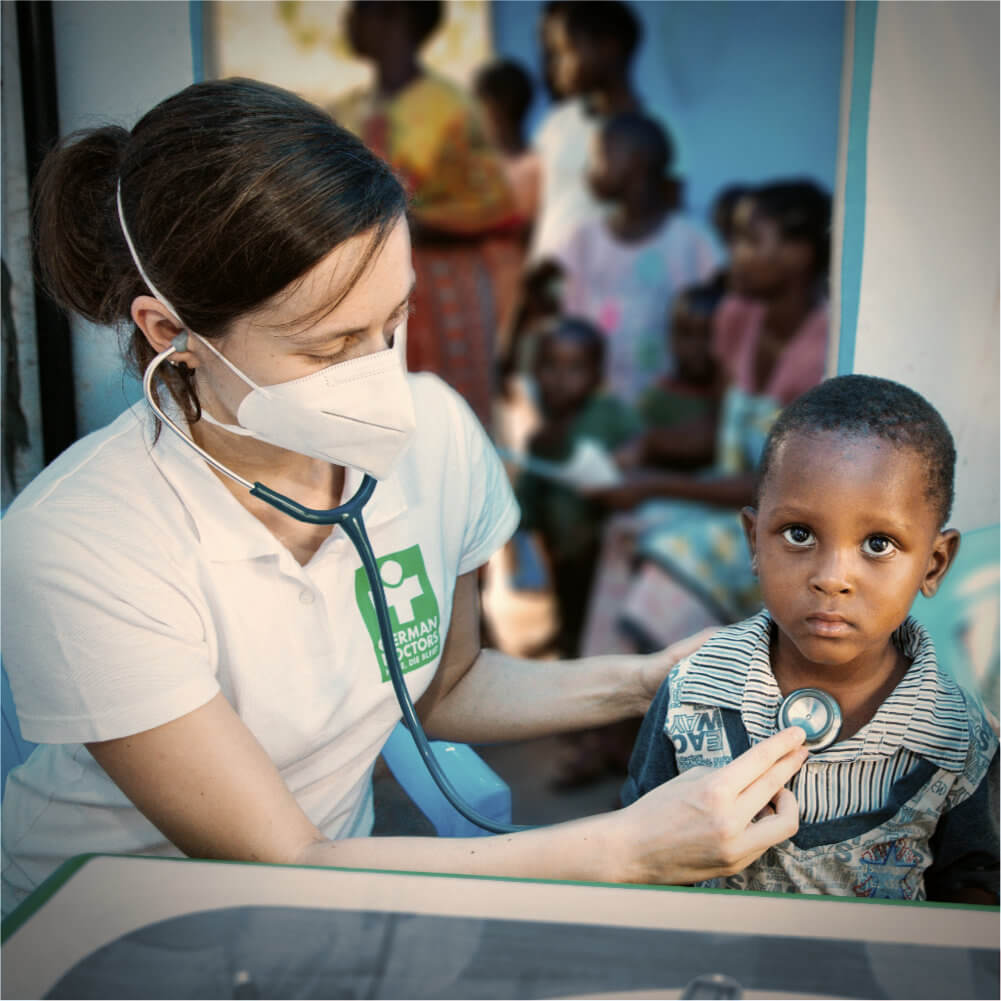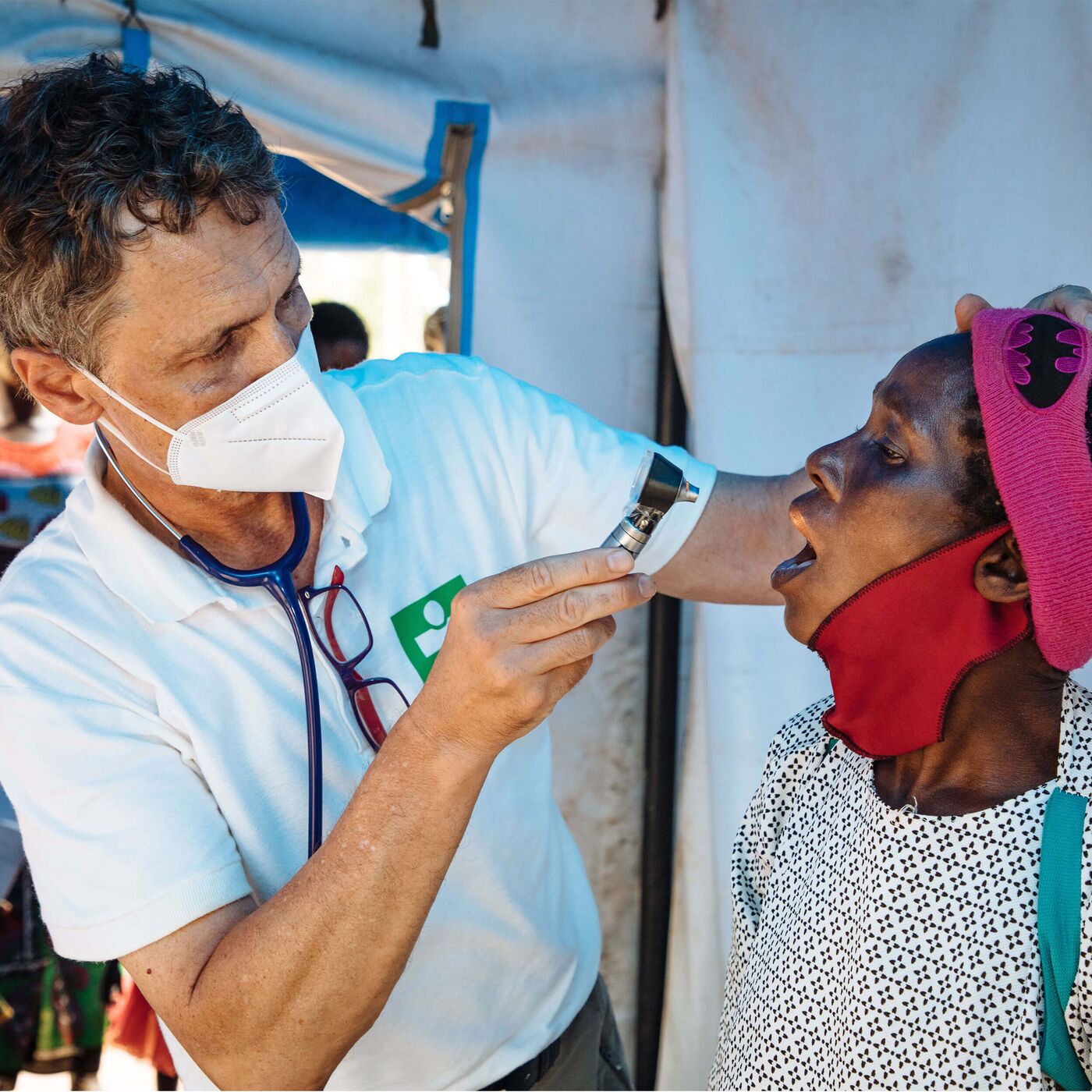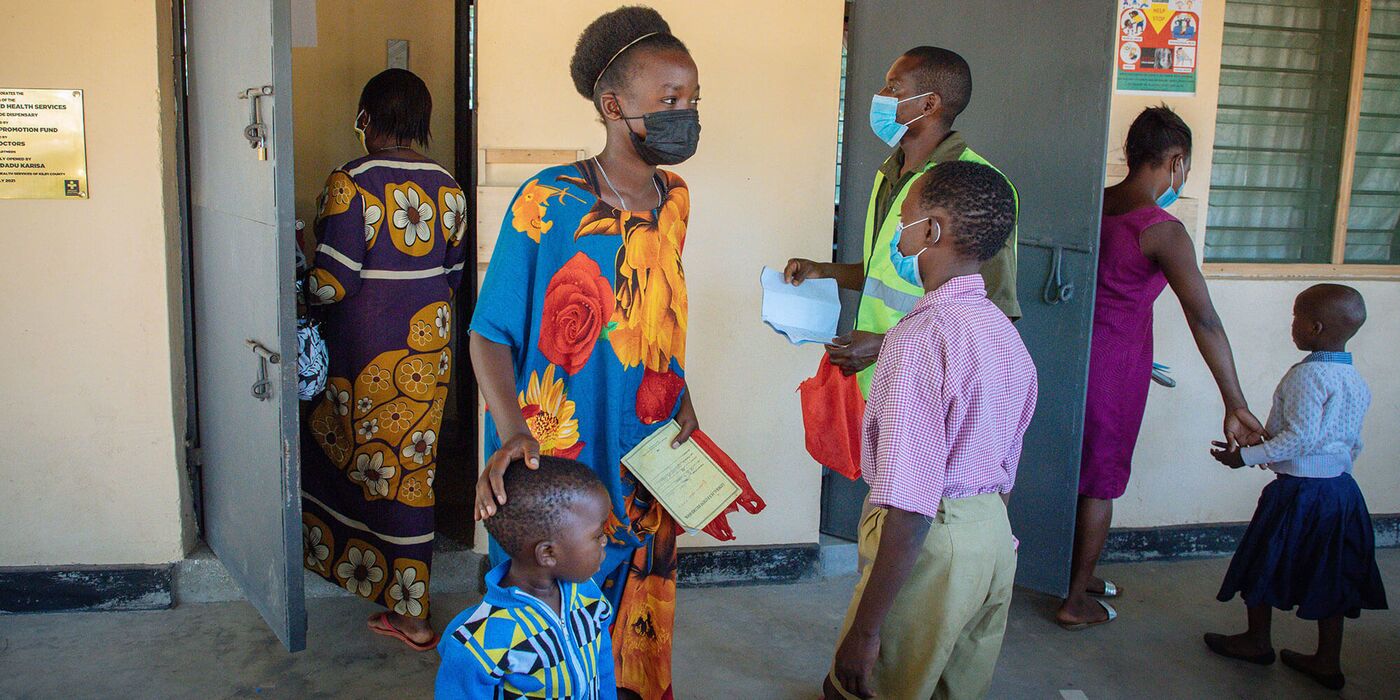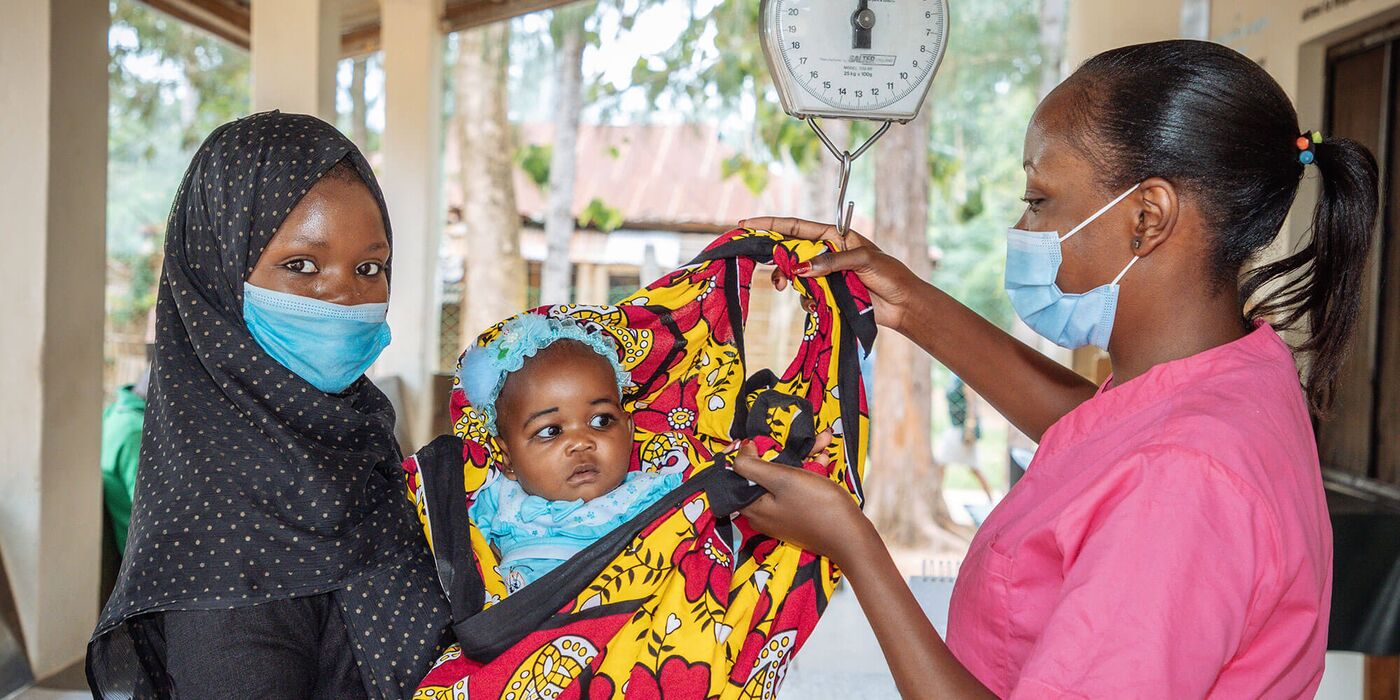Our Kilifi project
Survey
Kilifi Country: marked by poverty
In 2021 we expanded our aid in Kenya and opened a third doctors‘ project. Our outpatient clinic is located in the small village Bomani in the Kilifi district, about 30 kilometers north of Mombasa. Mango trees, palms, and innumerable corn and cocoanut plantations border the small settlements along the coast. But the green vegetation is deceiving. The barren earth is not well suited for agriculture, and the output of the subsistence economy is just enough to enable the families living there to survive. More than 70 % of the population in the region lives below the poverty level. The humble mud huts in which families live, often with many children, generally have neither drinking water nor sanitary facilities. Especially mothers, children, disabled persons, and the elderly suffer from the poor living conditions. We are particularly concerned about these people.






One outpatient clinic for 12,000 people
The foundation of medical aid is the district’s own outpatient clinic, the “Bomani-Malde Dispensary”. It is the only medical facility for the approximately 12,000 people living in the surrounding 11 villages. Before our German Doctors began holding their consultations there, the outpatient clinic was only open for a few hours a day, and it lacked medicines and well-trained personnel. Thanks to the generous support of the mediserv Bank, women will be able to deliver safely in the newly expanded delivery room. This provides a huge relief for the families because the way to Kilifi Town or Mombasa was simply too expensive and too far to go for delivery or even for regular check-ups. This is especially problematic at night, as pregnant women with contractions or complications do not have the chance to reach a hospital on the bumpy paths, even on a motorcycle. The results for both mother and child are often dramatic.
Kilifi Country: marked by poverty
In 2021 we expanded our aid in Kenya and opened a third doctors‘ project. Our outpatient clinic is located in the small village Bomani in the Kilifi district, about 30 kilometers north of Mombasa. Mango trees, palms, and innumerable corn and cocoanut plantations border the small settlements along the coast. But the green vegetation is deceiving. The barren earth is not well suited for agriculture, and the output of the subsistence economy is just enough to enable the families living there to survive. More than 70 % of the population in the region lives below the poverty level. The humble mud huts in which families live, often with many children, generally have neither drinking water nor sanitary facilities. Especially mothers, children, disabled persons, and the elderly suffer from the poor living conditions. We are particularly concerned about these people.
One outpatient clinic for 12,000 people
The foundation of medical aid is the district’s own outpatient clinic, the “Bomani-Malde Dispensary”. It is the only medical facility for the approximately 12,000 people living in the surrounding 11 villages. Before our German Doctors began holding their consultations there, the outpatient clinic was only open for a few hours a day, and it lacked medicines and well-trained personnel. Thanks to the generous support of the mediserv Bank, women will be able to deliver safely in the newly expanded delivery room. This provides a huge relief for the families because the way to Kilifi Town or Mombasa was simply too expensive and too far to go for delivery or even for regular check-ups. This is especially problematic at night, as pregnant women with contractions or complications do not have the chance to reach a hospital on the bumpy paths, even on a motorcycle. The results for both mother and child are often dramatic.
Dates & Facts
Project start: 2021.
Number of Doctors: There are always two German doctors
Missions: 28 volunteer outreaches since the project began.
Patient contacts: Around 16,000 treatments per year.
Partners: The project is carried out with several local partners. The Kenyan “Community Health Promotion Fund (CHPF)ʺ as the main initiator runs fundraising and is responsible for a local health program in the project area. The outpatient clinic ‟Bomani-Malde Dispensaryˮ, which is community owned and supported by the government, provides personnel, among other things. Students and staff members from the private, charitable medical training schools ‟North Coast Medical Training Collegeʺ (NCMTC) also support the project.
Structure: Our mission doctors work in the outpatient clinic ‟Bomani-Malde Dispensaryˮ. They also participate in various community activities. For example, they provide instructions concerning disease prevention and safe childbirth.






Mission locations: the communities Bomani, Junju, and Mto Mkuu.
Frequent health problems: malaria, respiratory diseases, diarrhoea, anemia, and chronic diseases, like high blood pressure and diabetes
Key aspects: Aside from general medical treatment, special attention is paid to mother-and-child health and building up health-provision facilities for the village communities.
Supported by: mediserv Bank
The project is financed by the mediserv Bank, which has been active in private billing since 1997. Mediserv offers members of medical services tailored accounting in the areas of billing, turnover, and financial management. Mediserv places importance on serving those weakest in society, both regionally and internationally. Their continuous support enables long-term planning of our Kilifi project and the provision of sustainable aid.
Project start: 2021.
Number of Doctors: There are always two German doctors
Missions: 28 volunteer outreaches since the project began.
Patient contacts: Around 16,000 treatments per year.
Partners: The project is carried out with several local partners. The Kenyan “Community Health Promotion Fund (CHPF)ʺ as the main initiator runs fundraising and is responsible for a local health program in the project area. The outpatient clinic ‟Bomani-Malde Dispensaryˮ, which is community owned and supported by the government, provides personnel, among other things. Students and staff members from the private, charitable medical training schools ‟North Coast Medical Training Collegeʺ (NCMTC) also support the project.
Structure: Our mission doctors work in the outpatient clinic ‟Bomani-Malde Dispensaryˮ. They also participate in various community activities. For example, they provide instructions concerning disease prevention and safe childbirth.
Mission locations: the communities Bomani, Junju, and Mto Mkuu.
Frequent health problems: malaria, respiratory diseases, diarrhoea, anemia, and chronic diseases, like high blood pressure and diabetes
Key aspects: Aside from general medical treatment, special attention is paid to mother-and-child health and building up health-provision facilities for the village communities.
Supported by: mediserv Bank
The project is financed by the mediserv Bank, which has been active in private billing since 1997. Mediserv offers members of medical services tailored accounting in the areas of billing, turnover, and financial management. Mediserv places importance on serving those weakest in society, both regionally and internationally. Their continuous support enables long-term planning of our Kilifi project and the provision of sustainable aid.
Outpatient Clinic
Medical provision – also for the very poorest
The situation analysis, which we carried out during the project’s planning phase, revealed a strong desire for improved medical provision in the region. The two nurses hired for the outpatient clinic in Bomani cannot care for all the needy patients. They are also not trained in complex treatments. This constitutes a special burden for the poorest members of the population, who hardly have access to healthcare services outside of their region and cannot afford them, anyway. One of our goals is, therefore, to provide medical training and ongoing training for local personnel on site. They acquire practical, hands-on knowledge from our mission doctors and the long-term doctor. The German Doctors are especially engaged in emergency treatments and care for pregnant women and chronically ill patients. Thanks to the generous support by the mediserv Bank, we are able to cover our running costs and make long-term, sustainable plans.





Investing in the future: training healthcare workers
We cooperate closely with the charitable training centers ‟North Coast Medical Training Collegeʺ (NCMTC) on site. The students are trained in primary medical care with an emphasis on the health of rural communities. Many training facilities in Kenya are located in cities, and their graduates have difficulties identifying with the problems and needs of the rural population. The students participate in activities of the village communities and perform laboratory tasks for the outpatient clinic to gather practical experience.
Safe childbirth for mother and child
Pregnant women and young mothers are especially endangered by a lack of medical care. An estimated 6,300 women die during pregnancy and childbirth in Kenya every year. A delivery ward including delivery room have been equipped in Bomani to ensure that women can deliver safely without having to travel a long distance. We dispatch a gynecologist to train the local colleagues in basic obstetric care on site several times a year. We expect about 700 deliveries annually.
Medical provision – also for the very poorest
The situation analysis, which we carried out during the project’s planning phase, revealed a strong desire for improved medical provision in the region. The two nurses hired for the outpatient clinic in Bomani cannot care for all the needy patients. They are also not trained in complex treatments. This constitutes a special burden for the poorest members of the population, who hardly have access to healthcare services outside of their region and cannot afford them, anyway. One of our goals is, therefore, to provide medical training and ongoing training for local personnel on site. They acquire practical, hands-on knowledge from our mission doctors and the long-term doctor. The German Doctors are especially engaged in emergency treatments and care for pregnant women and chronically ill patients. Thanks to the generous support by the mediserv Bank, we are able to cover our running costs and make long-term, sustainable plans.
Investing in the future: training healthcare workers
We cooperate closely with the charitable training centers ‟North Coast Medical Training Collegeʺ (NCMTC) on site. The students are trained in primary medical care with an emphasis on the health of rural communities. Many training facilities in Kenya are located in cities, and their graduates have difficulties identifying with the problems and needs of the rural population. The students participate in activities of the village communities and perform laboratory tasks for the outpatient clinic to gather practical experience.
Safe childbirth for mother and child
Pregnant women and young mothers are especially endangered by a lack of medical care. An estimated 6,300 women die during pregnancy and childbirth in Kenya every year. A delivery ward including delivery room have been equipped in Bomani to ensure that women can deliver safely without having to travel a long distance. We dispatch a gynecologist to train the local colleagues in basic obstetric care on site several times a year. We expect about 700 deliveries annually.
Health Promotion
More knowledge for more health
One of our important project goals is to teach people more about health. To achieve this goal, so-called ‟Health-Information Pointsˮ (HIPs) with training sessions and activities concerning health take place regularly. Six tents have been erected, all close to primary schools, so that health education can be integrated into the classes. Simple medical services are also offered in the HIPs. Since these lie scattered across the project area, they can be reached by the population without great effort.This also makes it possible, for example, for our co-workers to keep an eye on children’s healthy development and treat common problems, like skin diseases, gastrointestinal ailments, and infections promptly. Pregnancies are also medically supervised. Regular check-ups by a gynecologist, as are common in industrialized countries, are no matter of course in Kilifi.






Build up common healthcare structures
These socially aligned project components are sustained by all partners together. Diese sozial ausgerichtete Komponente des Projekts with staff members and students in the North Coast Medical Training Colleges (NCMTC) offer, for example, training sessions in the tents and perform basic medical examinations. The German Doctors are primarily responsible for the care of pregnant women and chronically ill patients. When necessary, vaccinations are also performed. Patients are referred to the outpatient clinic in Bomani for more complex examinations and treatments. The project is largely financed by the mediserv Bank.
More knowledge for more health
One of our important project goals is to teach people more about health. To achieve this goal, so-called ‟Health-Information Pointsˮ (HIPs) with training sessions and activities concerning health take place regularly. Six tents have been erected, all close to primary schools, so that health education can be integrated into the classes. Simple medical services are also offered in the HIPs. Since these lie scattered across the project area, they can be reached by the population without great effort.This also makes it possible, for example, for our co-workers to keep an eye on children’s healthy development and treat common problems, like skin diseases, gastrointestinal ailments, and infections promptly. Pregnancies are also medically supervised. Regular check-ups by a gynecologist, as are common in industrialized countries, are no matter of course in Kilifi.
Build up common healthcare structures
These socially aligned project components are sustained by all partners together. Diese sozial ausgerichtete Komponente des Projekts with staff members and students in the North Coast Medical Training Colleges (NCMTC) offer, for example, training sessions in the tents and perform basic medical examinations. The German Doctors are primarily responsible for the care of pregnant women and chronically ill patients. When necessary, vaccinations are also performed. Patients are referred to the outpatient clinic in Bomani for more complex examinations and treatments. The project is largely financed by the mediserv Bank.
Living conditions
Living from hand to mouth
The villages in our project area in Kilifi country lie along the coastal strip north of Mombasa. The area is largely rural and impoverished. Most of the families live from subsistence farming. The earth is barren, and the families often have no nourishing food for days during droughts and floods. There is little left to sell, and only very few people have a permanent job. Many people earn less than 5,000 Kenya shillings, which amounts to about 44 Euros monthly.




When school is a luxury
The poverty in the region is reflected not only in the high poverty rate of over 70%, but also in one of the lowest literacy rates in Kenya. Only 11% of the inhabitants has attended secondary school. There exist few perspectives to break out of the vicious cycle of poverty. How tragic, considering that more than half of the population is under 20 years of age and 30% under ten, which represents a typical population pyramid in developing countries.
Living from hand to mouth
The villages in our project area in Kilifi country lie along the coastal strip north of Mombasa. The area is largely rural and impoverished. Most of the families live from subsistence farming. The earth is barren, and the families often have no nourishing food for days during droughts and floods. There is little left to sell, and only very few people have a permanent job. Many people earn less than 5,000 Kenya shillings, which amounts to about 44 Euros monthly.
When school is a luxury
The poverty in the region is reflected not only in the high poverty rate of over 70%, but also in one of the lowest literacy rates in Kenya. Only 11% of the inhabitants has attended secondary school. There exist few perspectives to break out of the vicious cycle of poverty. How tragic, considering that more than half of the population is under 20 years of age and 30% under ten, which represents a typical population pyramid in developing countries.

